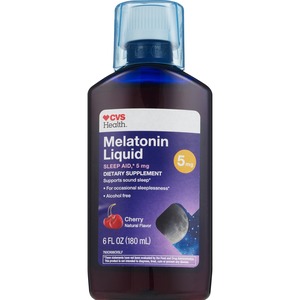Melatonin Pills
)
)
)
)
)
)
)
)
)
)
)
)
)
)
)
)
)
Shop more vitamins
Melatonin Supplements
If you struggle to fall asleep, melatonin pills may be able to help. In some studies, melatonin supplements have been shown to help with insomnia, trouble falling asleep due to jet lag, and occasional difficulty sleeping. Melatonin is non-habit forming and is widely available in CVS stores and online in a variety of dosages. If you suffer from sleep difficulties, talk to your doctor to find out if melatonin could be right for you.
What Is Melatonin?
If you have trouble falling asleep, staying asleep, or dealing with jet lag, a hormone called melatonin may be able to relieve your sleeping woes. Melatonin, a natural sleep aid, is created by the pineal gland, a tiny gland located in the center of the brain. When melatonin is produced by the pineal gland, it lets you know when it's time to go to sleep, and when it's time to wake up. The body makes more melatonin at night and then levels go down again as the sun comes up. If you need help sleeping, a melatonin supplement may be able to help.
How Does Melatonin Work?
Melatonin is a hormone found in the human body that helps to regulate the body's internal clock. Sometimes, your body may not produce enough, or may produce it at the wrong time of day. This can happen if you are suffering from jet lag, insomnia, or sleep cycle disturbances due to an unpredictable work schedule. Some studies have shown that synthetic melatonin supplements may be able to help reset your internal clock so that you can sleep more regularly.
How Long Does Melatonin Take To Work?
Typically, it takes around 30 minutes for melatonin to work. You should take melatonin 30 - 60 minutes before going to bed to get the best results.Ingredients such as croscarmellose sodium aid in effective distrubtion of OTC prescriptions to the body by allowing it properly disintegrate once ingested. It is found in numerous products aside from melatonin, inluding NSAIDs, laxatives, and motion sickness tablets.
When Should I Take Melatonin?
Because they can cause you to feel drowsy, you should take melatonin pills in the evening, just before bedtime. You can take melatonin on an as needed basis for problems with sleep, but before taking any supplements, it is always wise to check in with your doctor. This is especially important if you are taking any other medications because melatonin supplements may interact with certain prescriptions. Be sure to ask your doctor about any possible melatonin interactions before taking your first dose.
How Much Melatonin Should I Take?
As a general rule, you should take the minimum effective dose of melatonin. The recommended dose varies from one person to the next, and in particular may change depending on how sensitive you are to the supplement and the reason you are taking it. For example, if you are suffering from jet lag, the recommended dose may be higher than for insomnia. Be careful not to take too much melatonin, as this could cause unpleasant side effects like headaches, nausea, and irritability as well as actually further throwing off your sleep schedule. If you are unsure, ask your doctor what the safest and most effective dose is for you as an individual.
How To Take Melatonin?
Melatonin supplements are available in many forms, so you can choose which option works best for your needs. Melatonin pills are usually swallowed with water right before bedtime. Take care to read any directions or warnings on the product packaging, however, as not all brands are the same. Melatonin gummies are another popular choice. Simply chew the recommended amount of gummies right before bedtime.
How Long Does Melatonin Last?
How long melatonin lasts depends on the dosage. For example, a 0.5mg dosage may last an hour while 10mg may last several hours.
Is it Bad to Take Melatonin Every Night?
Melatonin is generally safe enough to take each night, however, there may be a few mild side effects. If you're taking melatonin for the first time, start with a very low dose and work your way up to a higher dose as needed. Most people experience things like daytime sleepiness or grogginess, mild headaches or dizziness, and stomach discomfort. Others may find that melatonin can make them feel slightly depressed, irritable, or cranky. Over time, your body should adjust to the melatonin and most side effects should subside. If you are taking blood thinners, drugs to suppress the immune system, birth control pills, or diabetes drugs, talk to your doctor before taking a melatonin supplement. These drugs may have negative interactions with melatonin.
Melatonin for Sleep
Those who have trouble falling and/or staying asleep on a regular basis may have insomnia. This condition can negatively affect your physical and mental health, which is why it's so important to make sure you're getting the sleep you need every night. You may take melatonin to help you with your sleep problems since this hormone can help to regulate the melatonin levels in the brain and encourage deeper, more restful sleep. Melatonin can also help people who work unusual shifts that may interrupt their normal sleep schedule. It's also helpful for those who suffer from jet lag, a common condition that makes you feel lethargic after crossing different time zones. As you age, your body makes less melatonin. Many people age 50 and older can benefit from taking a melatonin supplement, however, you should not take it if you've been diagnosed with dementia.
Búsquedas relacionadas
10 mg melatonin, nature’s bounty melatonin, olly sleep gummies, essential oil sleep aid, magnesium for sleeplessness, ayuda para dormir, apple cider vinegar supplements, superfood supplements, elderberry supplements, ashwagandha

)
)
)
)


)

)


